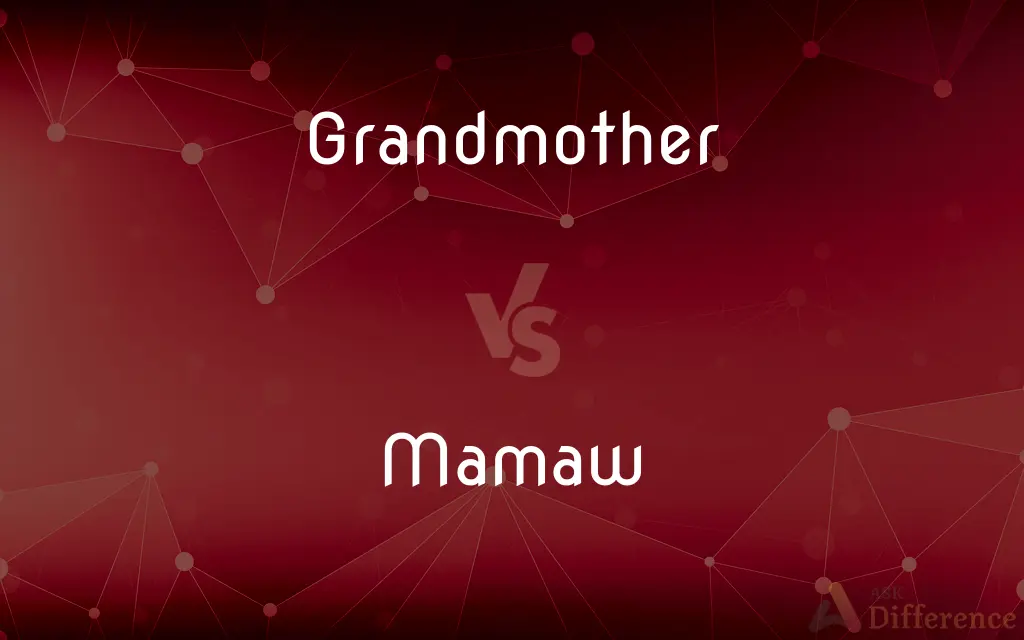Grandmother vs. Mamaw — What's the Difference?
By Tayyaba Rehman & Fiza Rafique — Updated on April 6, 2024
Grandmother is a formal term for a female grandparent, embodying tradition and lineage, while "Mamaw" is an affectionate, informal term used in certain cultures or regions.

Difference Between Grandmother and Mamaw
Table of Contents
ADVERTISEMENT
Key Differences
Grandmother refers to the mother of one's parent, a term recognized universally and carrying with it a sense of respect, tradition, and lineage. It's used formally in many societies and often invokes an image of wisdom and familial history. Mamaw, on the other hand, is a term of endearment used in certain English-speaking regions, particularly in the Southern United States, to refer to one's grandmother, adding a personal and affectionate touch to the familial role.
While the term grandmother might be used in official contexts or when referring to someone's grandmother in a formal or respectful manner, Mamaw is used more intimately within families or close community settings. It signifies a closer, more personal relationship, often associated with warmth, affection, and a down-to-earth family bond. Grandmother might be used in writing, in introductions, or in situations requiring formality, whereas Mamaw is likely used in daily conversation, especially within the family circle.
Culturally, the role of a grandmother can vary significantly but often involves aspects of guidance, familial history keeping, and nurturing. The use of Mamaw can also imply a specific cultural identity or heritage, reflecting regional dialects and traditions. This term may carry with it connotations of a matriarchal figure deeply embedded within the fabric of family life and community.
In literature and media, grandmothers are often portrayed as wise, nurturing figures, sometimes with a strong connection to traditions and storytelling. Characters referred to as Mamaw in these contexts might be imbued with similar qualities but with an added layer of intimacy and regional flavor, emphasizing their role within the dynamics of a closely knit family or community.
Different families and cultures have unique ways of expressing respect and affection towards elder family members. While some might prefer the more traditional and formal grandmother, others opt for endearing terms like Mamaw, which highlight the personal connection and affectionate regard for these important family figures.
ADVERTISEMENT
Comparison Chart
Formality
Formal, universal
Informal, affectionate
Cultural Usage
Widely recognized across cultures
Predominantly used in Southern U.S.
Connotation
Respect, tradition, lineage
Warmth, affection, personal bond
Context of Usage
Official contexts, formal introductions
Daily conversation, within families
Implications
Implies a generational link and history
Suggests a closer, familial connection
Compare with Definitions
Grandmother
Represents a formal familial role.
At the reunion, my grandmother was the guest of honor.
Mamaw
Denotes a close, affectionate relationship.
Mamaw and I spend our afternoons gardening together.
Grandmother
The mother of one's father or mother.
Every summer, we visit my grandmother in her countryside home.
Mamaw
A colloquial term for grandmother, especially in the Southern U.S.
Mamaw's house is always filled with the smell of fresh-baked pies.
Grandmother
A term denoting lineage and respect within a family.
My grandmother holds the history of our family in her stories.
Mamaw
Reflects regional dialect and cultural identity.
In our town, nearly everyone calls their grandmother Mamaw.
Grandmother
Symbolic of tradition and heritage.
My grandmother passes down our cultural traditions through her recipes.
Mamaw
Implies an informal familial role filled with warmth.
Mamaw always tells the best stories from her childhood.
Grandmother
Often associated with wisdom and guidance.
My grandmother taught me valuable life lessons.
Mamaw
Associated with a matriarchal figure in the family.
Mamaw is the heart and soul of our family gatherings.
Grandmother
The mother of one's father or mother
Grandmother Asha
To dearest Grandmother, with love and gratitude
My grandmother is ill
Mamaw
One's mother.
Grandmother
The mother of one's father or mother.
Mamaw
One's grandmother, especially one's maternal grandmother.
Grandmother
A female ancestor.
Mamaw
One's mother.
Grandmother
A mother of someone's parent.
Grandmother
A female ancestor or progenitor.
Grandmother
The mother of one's father or mother.
Grandmother
The mother of your father or mother
Common Curiosities
Can anyone be called Mamaw, or is it specific to family?
Typically, Mamaw is a term of endearment used within families to refer to a grandmother.
Is it appropriate to use Mamaw in formal settings?
Mamaw is generally reserved for informal, family-centric contexts rather than formal settings.
Is Mamaw a term used worldwide?
No, Mamaw is primarily used in certain English-speaking regions, especially in the Southern United States.
Does the use of Mamaw over grandmother imply a closer relationship?
Often, yes. Mamaw is used to denote a close, personal bond, whereas grandmother might be seen as more formal.
Are there other informal terms similar to Mamaw?
Yes, terms like Grandma, Nana, and Granny serve similar affectionate roles in other cultures or regions.
Can the term grandmother be used affectionately?
Absolutely. While it is a formal term, it can carry deep affection and respect within its traditional use.
How do cultural perceptions of grandmother and Mamaw differ?
Cultural perceptions can vary, with grandmother often viewed through a lens of respect and tradition, and Mamaw through closeness and personal connection.
Does the preference for Mamaw or grandmother vary by generation?
Preferences can vary widely, often influenced by regional culture, family traditions, and personal choice.
Are there specific duties associated with being a Mamaw?
While not formally defined, the role often involves nurturing, storytelling, and imparting wisdom, similar to a grandmother.
How do new generations decide between using grandmother or Mamaw?
The choice often depends on family tradition, regional influences, and personal preference.
How do grandchildren typically refer to their grandmothers in formal documents?
In formal documents, the term grandmother or the grandmother's full name is typically used.
Is the role of a grandmother changing in modern families?
The core roles of nurturing and guidance remain, though modern grandmothers may also embody more diverse and active lifestyles.
Can men have similar affectionate terms?
Yes, affectionate terms for grandfathers, like Grandpa or Papaw, mirror the warmth and closeness associated with Mamaw.
What impact does a grandmother or Mamaw have on family heritage?
Both play crucial roles in transmitting family history, traditions, and values, fostering a sense of identity and continuity.
Do terms like Mamaw have equivalents in other languages?
Many languages have their own affectionate terms for grandparents, reflecting similar sentiments of warmth and closeness.
Share Your Discovery

Previous Comparison
Vow vs. Wow
Next Comparison
Couple vs. PairAuthor Spotlight
Written by
Tayyaba RehmanTayyaba Rehman is a distinguished writer, currently serving as a primary contributor to askdifference.com. As a researcher in semantics and etymology, Tayyaba's passion for the complexity of languages and their distinctions has found a perfect home on the platform. Tayyaba delves into the intricacies of language, distinguishing between commonly confused words and phrases, thereby providing clarity for readers worldwide.
Co-written by
Fiza RafiqueFiza Rafique is a skilled content writer at AskDifference.com, where she meticulously refines and enhances written pieces. Drawing from her vast editorial expertise, Fiza ensures clarity, accuracy, and precision in every article. Passionate about language, she continually seeks to elevate the quality of content for readers worldwide.














































